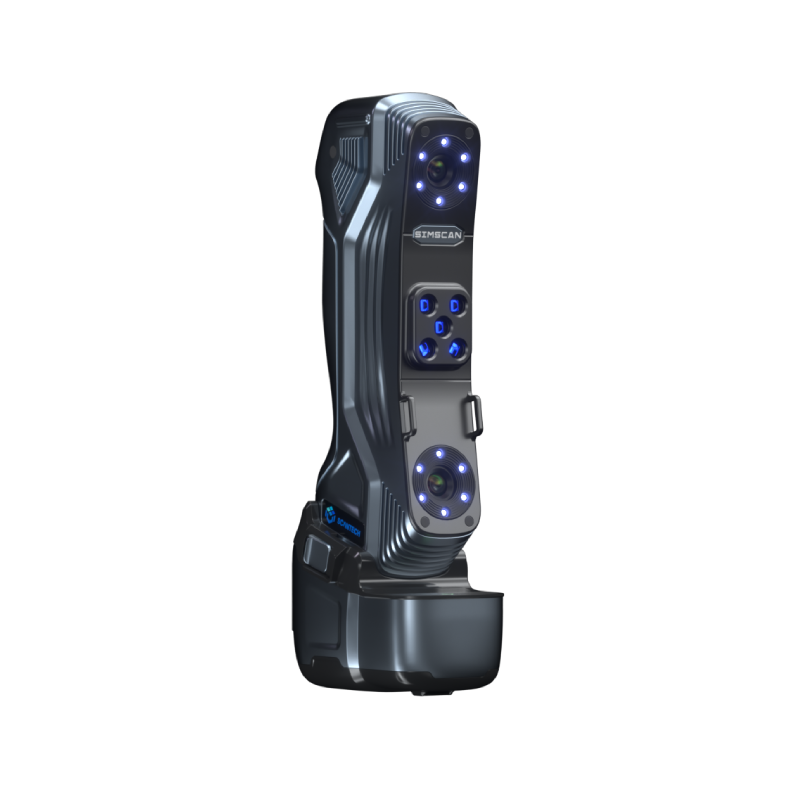Summary
Technicians from a wind power equipment manufacturing company measured and inspected a large-scale flange of an offshore wind power foundation with Scantech’s portable 3D laser scanner KSCAN-Magic and photogrammetry system MSCAN-L15.
The project aimed to capture its full-filed data and inspect whether it meets the geometric dimensioning and tolerancing requirements. Its 120 bolt holes were inspected and specific GD&T such as position and flatness was obtained.
Background
Wind power, a sustainable, renewable, and clean energy source, is increasingly widely used to generate electricity for industries. It has a much smaller impact on the environment when compared to traditional fossil fuels.
Wind power is generated in both onshore and offshore wind farms, consisting of many individual wind turbines. The construction and maintenance costs of offshore wind farms are high. Therefore, it is crucial to ensure the part of the wind turbine and tower are within stringent requirements.
Goals of the Project
The customer, in this case, is Jutal Offshore Oil Service Co., Ltd. which was established in 1995 and is listed on the main board of the Hong Kong Stock Exchange since September 2006.
It provides customers from Oil and Gas industry with technologically advanced oil and gas equipment manufacturing, offshore engineering, module construction, and technical support services.
Utility-scale wind turbines are large and heavy, and their parts usually come in large sizes. The flange is as high as 10 meters and as wide as 6 meters.
The company wants to measure and inspect the flange to ensure it is within GD&T requirements so that it can fit into the foundation of an offshore wind turbine successfully.
A dimensional check should be performed by an optical 3D laser scanner on the flatness and parallelism of its surfaces. The diameters of bolt holes and their position, angles, and other parameters need to be measured. It is required that the accuracy of measurement results shall be 0.1 mm.
Challenge
Large-scale Part
The part is in the shape of a cylinder and as high as 10 meters with a diameter of 6 meters. The flange to be measured is located at the top of the part. It is difficult to measure such a large part which is also high above the ground.
Harsh Conditions on Shop Floor
The product equipment like machines and handling equipment like cranes on the shop floor cause vibrations. It is unavoidable that the environmental vibrations may impact the measurement results as the flange has to be measured on-site. And the shop floor is filled with dust and welding sparks, which poses a huge challenge to the measurement.
High Volume of Measurement Tasks
The technicians had to deal with a high volume of measurement tasks as they need to measure the GD&T like the position of 120 bolt holes in a short amount of time.
Workflow
Device Used: KSCAN Magic + MSCAN L15
By 3D scanning the whole flange, the technician obtained the whole point cloud of the part. Paired with Scantech’s 3D software, they obtained specific values of GD&T.
The flatness and parallelism of the upper and lower surfaces of the flange were inspected. Besides, the positions, angles between two bolt holes and pitch circle center, as well as the pitch circle diameter were measured.
Disadvantages of Traditional Methods
The measurement methods the customer used were traditional tools such as an electronic total station and caliper. Their disability to capture full-filed data, poor measurement accuracy of around 0.5 mm, complex operation, and low efficiency make them incapable to handle the measurement tasks.
Specially, traditional measurement methods can only measure for two-dimensional parameters like the distance, and fail to measure for three-dimensional parameters of GD&T such as the position of bolt holes.
Besides, the electronic total station cannot measure the lower surface of the flange as the area is narrow and hard to reach.
The environmental vibrations and dusts have a large impact on the measurement conducted by the electronic total station, and the inspection report fails to meet the standards of its customers.
Advantages of Scantech’s 3D Solution
High Accuracy
By combing photogrammetry system MSCAN-L15 whose volumetric accuracy is up to 0.015mm/m and the handheld 3D scanner KSCAN-Magic with an accuracy of up to 0.020 mm, engineers help to obtain precise measurement results.
Full-field Data
With robust 3D scanning, Scantech’s 3D solution supports the capture of full-field 3D data, which can be used for further archiving. The complete data can be used to ensure the part is qualified so that it can fit into the foundation precisely.
Unaffected by Harsh Conditions
Engineered with a robust algorithm and made of aerospace-grade aluminum alloy, KSCAN-Magic remains unaffected by vibrations, dusts, and sparks of the environment.
It is portable and lightweight and can be carried around to fulfill measurement tasks. The robust features of the 3D scanner KSCAN-Magic make it an optimal solution for on-site measurement.
Intuitive Data for Inspection and Maintenance
With Professional analysis software, users can get intuitive and comprehensive data and reports. The data provides references for technicians to establish repair plan accordingly. By basing their corrective actions on better statistical analyses, they reduced the number of repairs and improved efficiency.
























 All Products
All Products 











 en
en 





















